MBI’s primary focus is connecting Christians with frontline missions, which typically means YWAM ministries. But sometimes our staff stretches our boundaries in God-sized ways, and we knew our readers would love to hear and perhaps be part of this unfolding story:
Gregg Scott knows that clean, available water is life’s most basic need. As part of MBI’s field staff, he has devoted himself to helping people in emerging nations supply themselves with this precious commodity using appropriate, sustainable technology tailored to their needs and abilities.
Since 1996 Gregg has served wit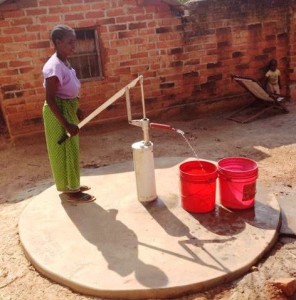 h the Bali Appropriate Technology Institute (BATI), helping Indonesians cultivate local water supplies. In 2014, he was contacted by Father Hugo Lungu, an African priest from southwestern Tanzania serving small Catholic parishes in Central Montana. At Lungu’s invitation, Gregg accompanied the priest to his home village of Mwanamanga to conduct a water survey. There he found 8000 people with virtually no water except for what could be drawn from four barely-working wells by way of hand pumps. Three other pumps sat useless, including one serving 450 school children, forcing them to haul buckets of water to school for drinking and flushing toilets. Village women carried five-gallon buckets of “pure” water on their heads from open-pit, untreated wells.
h the Bali Appropriate Technology Institute (BATI), helping Indonesians cultivate local water supplies. In 2014, he was contacted by Father Hugo Lungu, an African priest from southwestern Tanzania serving small Catholic parishes in Central Montana. At Lungu’s invitation, Gregg accompanied the priest to his home village of Mwanamanga to conduct a water survey. There he found 8000 people with virtually no water except for what could be drawn from four barely-working wells by way of hand pumps. Three other pumps sat useless, including one serving 450 school children, forcing them to haul buckets of water to school for drinking and flushing toilets. Village women carried five-gallon buckets of “pure” water on their heads from open-pit, untreated wells.
Although Gregg wasn’t in Mwanamanga to work, like many mission builders, he says he just couldn’t walk away without doing something. Selecting three young village men willing to learn a new trade and take responsibility, Gregg set about making simple repairs and training the men to do the same. He has since made two other trips to continue that training.
“Our initial efforts were relief,” Gregg says, “but the long-term goal is community development so the village becomes self-sustaining. I have to be sure the people can and will do it; relief without the goal of development is nothing but a crutch, and that passes a welfare mentality on to other generations. I promote two things: there must be no corruption and no leaks in the pumps. I tell them corruption is like a leak, and it runs everything down. Water leaks are also a type of corruption that takes resources away from the people. If I can get them to learn these things, I feel I’ve done something.”
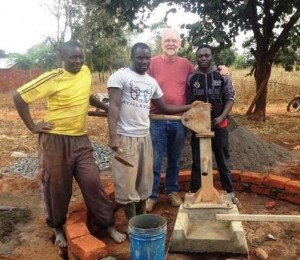 Gregg’s three “boys,” his pump maintenance crew, are a significant part of the community development plan. Along with a local engineer, Gregg is training these men, giving them as much responsibility as possible and taking care not to do anything for them they could do themselves. “It’s all about relationship. I was calling the shots and teaching,” he says, “but giving them choices to make that made them think they were doing it.” The crew repaired the old pumps, and Gregg taught them how to put in new pumps because he couldn’t stay to help. “The day after I left, they called to say they had installed the first pump—by themselves—and within a week had three in. I had to trust them to do it, and they did a great job without me. They were learning to be leaders!”
Gregg’s three “boys,” his pump maintenance crew, are a significant part of the community development plan. Along with a local engineer, Gregg is training these men, giving them as much responsibility as possible and taking care not to do anything for them they could do themselves. “It’s all about relationship. I was calling the shots and teaching,” he says, “but giving them choices to make that made them think they were doing it.” The crew repaired the old pumps, and Gregg taught them how to put in new pumps because he couldn’t stay to help. “The day after I left, they called to say they had installed the first pump—by themselves—and within a week had three in. I had to trust them to do it, and they did a great job without me. They were learning to be leaders!”
“I’ve had inquiries from four other villages,” Gregg says, “but I’ve had to turn them down for now. The need is huge. I could spend a lifetime there, so my goal is to find others to take over for me, to train one village so that it can train another. But each will need some funding from the West for the infrastructure (I tell them, however, if they don’t do the right thing with the money, I won’t come back).”
Gregg’s approach to the people of Mwanamanga has had a profound impact. He lives in the village whenever he is there and has a keen eye for their needs. He makes the women and girls giggle when he hauls water—traditionally a woman’s job. He gave a pair of shoes to an older man, of which the man was exceedingly proud. In a culture where respect for elders is obligatory, Gregg is approachable and has fun with the young men. When asked once what Americans like to eat, he had difficulty explaining hamburgers, so he made them for his friends (from sausage provided by nuns at the convent). After dinner, a man named Sampson, tears in his eyes, addressed Gregg for twenty minutes, saying: “White people don’t come stay in the village with us. You came and stayed.…”
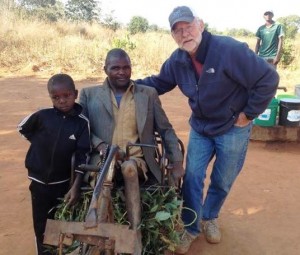 It turns out there was more than just a need for clean water in Mwanamanga. Once again, Gregg found he couldn’t walk away without doing something about what he saw: a man lying on a mat, crippled by cerebral palsy; people dragging themselves along, their knees wrapped in rags—all because there are no crutches or wheelchairs to be had. These and other medical supplies are virtually non-existent, even in the clinics and hospitals, because corruption bleeds off such resources.
It turns out there was more than just a need for clean water in Mwanamanga. Once again, Gregg found he couldn’t walk away without doing something about what he saw: a man lying on a mat, crippled by cerebral palsy; people dragging themselves along, their knees wrapped in rags—all because there are no crutches or wheelchairs to be had. These and other medical supplies are virtually non-existent, even in the clinics and hospitals, because corruption bleeds off such resources.
Prior to his time in Tanzania, Gregg collected donated medical supplies and equipment to send where they would be most needed. If he could get shipping containers, he knew he could send these necessities to the Tanzanian villages. The local Veteran’s Administration donated crutches and wheelchairs as well as other devices for the disabled.* Then a friend donated 4×40-foot insulated shipping containers—one per year for four years—which could go on to have a second life as either rodent- and heat-free storage for the villagers’ maize or as a workshop for the village maintenance crew.
But there is only so much one person can do. “I’m still involved in Indonesia, but this ministry in Tanzania has become bigger than I imagined. It’s only going to continue if I can get a team put together quickly and raise about $100,000 a year to be able to go from village to village.” Currently, Gregg works alone on all the logistics and funds his time on the ground in Tanzania out of his own pocket—a strain on any missionary’s budget. To make a real difference for Tanzanians, he needs a home team to tackle everything from fundraising to correspondence; from sorting supplies to managing a website and social media. Until then, he is one man against a mountain.
You are invited to help Gregg provide training, clean water, and aid for the disabled in Tanzanian villages. Donations may be made online at www.missionbuilders.org, or checks can be made payable to MBI—including a separate note that reads Tanzania Water Project—and sent to PO Box 406, Lakeside, MT 59922. Contact MBI at 406.285.8525 about hands-on opportunities.
*Gregg gratefully acknowledges the various Catholic parishes in Kalispell and Central Montana, the Rotary Club of Kalispell, the Veterans Administration, personal supporters, MBI staff and all the folks who have given so much and so selflessly toward this project.
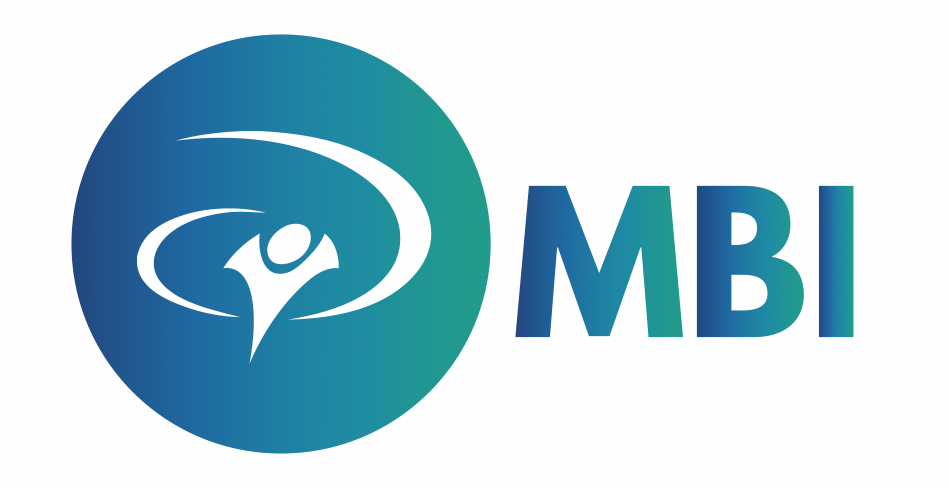
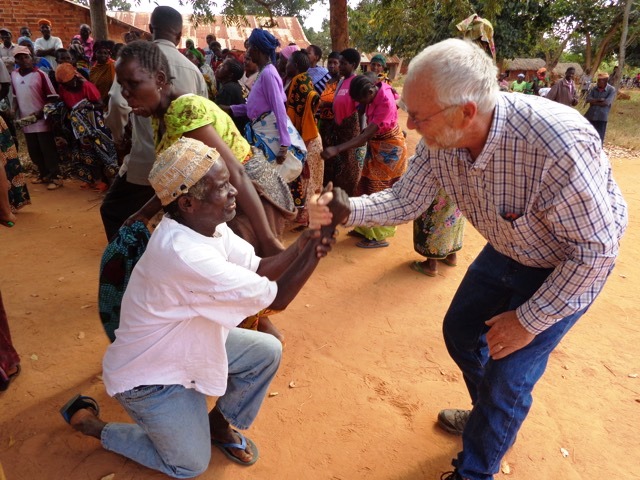
God bless your work in Africa Gregg. You’re doing awesome work for the Kingdom of God.
Excellent! Excellent!
Good to see this. We still think fondly of our time in Kona.
May God continue to bless you.
Thank you for your vision and hard work. I am interested in helping.
Awesome opportunity and follow through! Great job by a great guy!
Gregg, you’re a man with a great heart for others and a great heart for God!
The Water of Life for those villagers. Awesome!
Great, great story! Good job.
Praise God for the Living Water, and the well that never runs dry. How appropriate to supply their physical needs so they can accept the spiritual news.
I had just recently been wondering what the Scotts were doing. We were in DTS/Kona
together in 1995. I too, say great job. Numb 6:24-26
You’re the man Gregg! Great story and proud to call you my friend!
Praying for you brother! Sounds like a great project and that God is using you in amazing ways. May He provide all that you need to fulfill that which he has called you to.
An amazing story of what one man in God’s hands can do. Keep up the great work Gregg.
Keep it up Gregg Scott. may the Lord bless you- Proverbs 3:27
We really appreciate you on behalf of the Mwanamonga villagers.